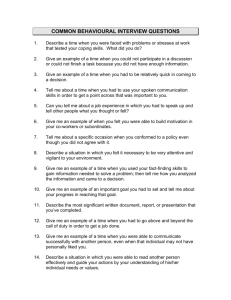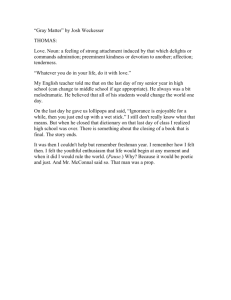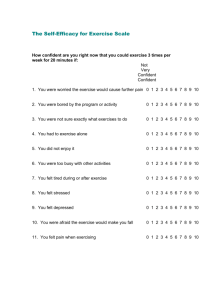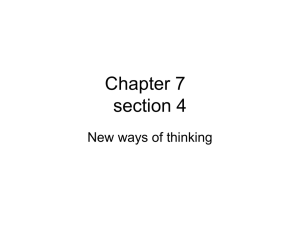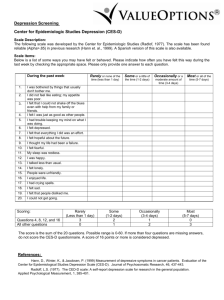Measurement Tools to Enhance Health
advertisement
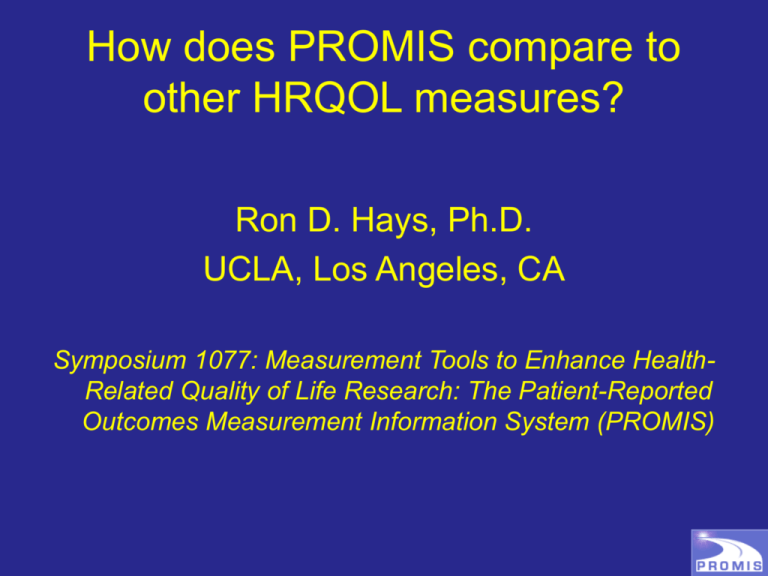
How does PROMIS compare to other HRQOL measures? Ron D. Hays, Ph.D. UCLA, Los Angeles, CA Symposium 1077: Measurement Tools to Enhance HealthRelated Quality of Life Research: The Patient-Reported Outcomes Measurement Information System (PROMIS) Advantages of Short-Forms Developed from Item Banks • Select a set of items that are matched to the severity level of the target population. • All scales built from the same item bank are linked on a common metric. Depressive Symptoms Form C Depression Symptoms Form A no depression mild depression Depression Symptoms Form B moderate depression severe depression extreme depression Depressive Symptoms Item Bank Item 1 Item 2 Item 3 Item 4 Item 5 Item 6 Item 7 Item 8 Item 9 Item n Computerized Adaptive Testing (CAT) • CAT selects each question to be administered based on a person’s response to previously administered questions. • By iteratively estimating a person’s standing on the domain (e.g., depressive symptoms) and administering the most informative items, the maximum possible level of precision can be obtained with the fewest number of questions. Example of Short Forms and CAT • Compare results from respondents based on two different depressive symptoms short forms, CAT, and full item bank. • Do they produce equivalent results? • Implications for use of alternate PROMIS short forms in clinical trials. Respondent (n = 752) Characteristics Responded to the 28 items in the PROMIS depressive symptoms item bank – Mean age = 51 (18-93 range) – 52% female – 78% white, 10% Hispanic, 10% black – 22% high school graduate or less Ordering of 28 Depressive Symptom items, Least to Most Severe (Short Form A and B items indicated with superscript) # Item # Item 1 I felt sadb 15 I felt guilty 2 I felt disappointed in myselfa 16 I felt that I was not as good as other people 3 I felt unhappyb 17 I felt that nothing was interestingb 4 I felt discouraged about the futurea 18 I felt like a failurea 5 I felt pessimistic 19 I felt that my life was emptyb 6 I felt emotionally exhausted 20 I felt that I was not needed 7 I had trouble feeing close to people 21 I felt that I had nothing to look forward toa 8 I felt lonely 22 I felt upset for no reason 9 I felt depressed 23 I felt helplessb 10 I found that things in my life were overwhelminga 24 I felt that nothing could cheer me upa 11 I had trouble making decisions 25 I felt hopelessb 12 I felt ignored by people 26 I felt worthlessa 13 I withdrew from other people 27 I felt that I wanted to give up on everythingb 14 I felt that I was to blame for things 28 I felt I had no reason for livinga Form A Items # In the past 7 days… Mean % Never 2 I felt disappointed in myself. 2.05 41 4 I felt discouraged about the future. 2.03 44 1.85 51 1.68 62 1.61 65 1.56 66 1.51 71 1.29 82 10 I found that things in my life were overwhelming. 18 I felt like a failure. 21 I felt that I had nothing to look forward to. 24 I felt that nothing could cheer me up. 26 I felt worthless. 28 I felt I had no reason for living. Response Options: Never, Rarely, Sometimes, Often, Always Form B Items In the past 7 days… Mean % Never 1 I felt sad. 2.08 36 3 I felt unhappy. 2.05 39 9 I felt depressed. 1.87 50 17 I felt that nothing was interesting. 1.69 55 19 I felt that my life was empty. 1.67 64 23 I felt helpless. 1.56 67 25 I felt hopeless. 1.53 68 27 I felt I wanted to give up on everything. 1.46 73 # Response Options: Never, Rarely, Sometimes, Often, Always Mean, Minimum and Maximum Scores Form A (8 items) Form B (8 items) CAT Full Bank (8 items) (28 items) Mean 49 49 49 49 Minimum 38 37 35 33 Maximum 82 82 84 86 Correlations Among Forms Form A Form B CAT Form A 1.000 Form B 0.895 1.000 CAT 0.946 0.958 1.000 Bank 0.953 0.955 0.976 Scale Score Comparisons: Short Forms, CAT (8 items) and Full-Bank (28 Items) 60 60 Correlation of Depressive Symptoms Bank with CESD 50 40 0 10 20 30 CESD 30 20 10 0 0 100 250 -2 -1 0 1 2 3 4 2 3 4 Depression 0 80 CESD 40 50 r =0.84 -2 -1 0 1 Depression Fatigue • Experience and Impact • 95-item bank • Legacy Instruments • SF-36 Vitality Scale (4 items) • FACIT-Fatigue Scale (13 items) Comparison of Measurement Precision Full-length Item Bank vs. Legacy vs. CAT vs. Short-form 0.6 4-item SF36/Vitality 4-item CAT 13-item FACIT-Fatigue 13-item CAT 98-item Bank 0.5 Standard Error 0.4 SE=0.32 (r=0.90) 0.3 SE=0.22 (r=0.95) 0.2 0.1 0 -2.5 No Fatigue -1.5 -0.5 0.5 1.5 2.5 Severe Fatigue PROMIS Fatigue Short Form In the past 7 days … FATEXP 20 FATEXP 5 FATEXP 18 FATIMP 33 FATIMP 30 FATIMP 21 FATIMP 40 Never Rarely SomeOften Always times How often did you feel tired? How often did you experience extreme exhaustion? How often did you run out of energy? How often were you too tired to think clearly? How often were you too tired to take a bath or shower? 1 2 3 4 5 How often did you have enough energy to exercise strenuously? 1 2 3 4 5 How often did your fatigue limit you at work (include work at home)? 1 1 1 1 1 2 2 2 2 2 3 3 3 3 3 Garcia SF et al, J Clin Onc, 2007. © 2007 Reprinted with permission of the PROMIS Health Organization and the PROMIS Cooperative Group 4 4 4 4 4 5 5 5 5 5 Comparison of Measurement Precision Full-length Item Bank vs. Legacy vs. CAT vs. Short-form 0.6 7-item Short-form 7-item CAT 98-item Bank Standard Error 0.5 0.4 SE=0.32 (r=0.90) 0.3 SE=0.22 (r=0.95) 0.2 0.1 0 -2.5 No Fatigue -1.5 -0.5 0.5 1.5 2.5 Severe Fatigue Physical Functioning 5 0.5 SF-36 10 items 4 0.4 SE = 3.2 rel = 0.90 3 0.3 PROMIS 10 items SE = 2.2 rel = 0.95 2 0.2 PROMIS CAT 10 items 1 0.1 SF 00 -4 10 -320 PROMIS static -2 10 -1 30 40 PROMIS CAT 10 0 50 1 60 2 70 Questions? Item Response Theory (IRT): Category Response Curves In the past 7 days, I felt unhappy. 1.0 Never 0.8 Rarely Some times Always Often P 0.6 0.4 0.2 0.0 -3.00 -2.00 very mild In the past 7 days, I felt I had no reason for living. -1.00 0.00 1.00 2.00 3.00 severe Depressive Symptoms 1.0 Never 0.8 Some Always times Often Rarely P 0.6 0.4 0.2 0.0 -3.00 very mild -2.00 -1.00 0.00 1.00 Depressive Symptoms 2.00 3.00 severe
